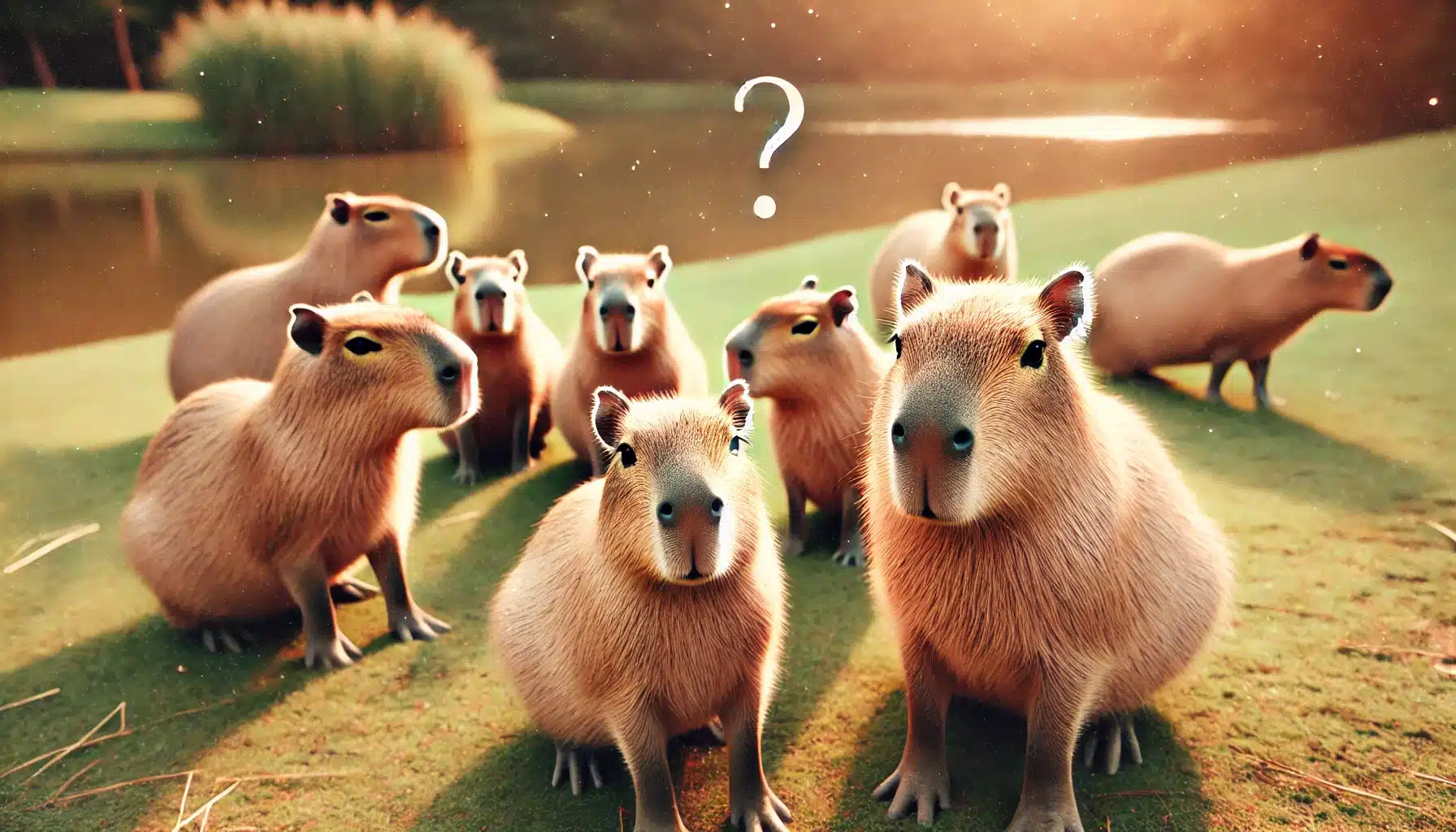Capybaras, the largest rodents on the planet, are increasingly capturing the hearts of animal enthusiasts. But the question arises: Can these gentle giants be more than just a fascination and become a part of our homes? Yes, you can have a capybara pet, but it’s a complex and significant commitment. These large, social rodents require specific care, ample space, and usually need to be kept in pairs or groups for their well-being.
Native to South America, capybaras are semi-aquatic mammals known for their calm demeanor and social nature. Weighing up to 170 lbs and growing up to 4 feet in length, they require ample space and a significant water body for their well-being. Their diet mainly consists of grasses and aquatic plants, making them herbivores by nature.
Before considering a capybara as a pet, it’s crucial to understand the legal and ethical implications. Laws regarding rare pet ownership vary by region. For instance, while it’s legal in some states like Texas, Washington, North Carolina, Arizona, Arkansas, Indiana, Florida, and Tennessee. However, even within these states, certain cities may have their own restrictions, so it’s crucial to check local laws as well.
Conversely, capybaras are illegal to keep as pets in some states, including California and Georgia. The reasons for this prohibition often stem from concerns about the potential ecological impact if capybaras were to escape or be released into the wild.
Capybaras, being large and capable of breeding in the wild, could become invasive species, disrupting local ecosystems and proving difficult to control or eradicate. This concern is akin to the challenges posed by other invasive species, such as the nutria.
Did you know? Capybaras are closely related to guinea pigs and share many characteristics with them. They can hold their breath underwater for about five minutes, showcasing their semi-aquatic lifestyle.
Is It Legal to Own a Pet Capybara?
Owning a pet capybara is a complex issue, and its legality varies depending on your location. In the United States, laws regarding exotic pet ownership differ from state to state and even from city to city.
Some states, such as California and Georgia, have banned capybaras as pets, while others, like Texas, Pennsylvania, and New York, allow them with certain permits and health certificates. It’s essential to check with your local authorities to determine if owning a pet capybara is legal in your area.
Even if it’s legal to own a pet capybara in your state, some cities may have their own laws and regulations. For example, capybaras are considered illegal pets in the five boroughs of New York City.
Before bringing a capybara into your home, make sure you understand the local and state laws regarding exotic pet ownership.
Capybara as a Pet: Ethics and Responsibilities

Keeping a capybara as a pet is a significant commitment, and it’s crucial to consider the ethics and responsibilities involved. Capybaras are wild animals that belong in their natural habitats, not in domestic environments. They have complex social and spatial needs that are challenging to replicate in a home setting.
Capybaras are herd animals that thrive in the company of other capybaras. Keeping a single capybara as a pet can be detrimental to its mental and physical health. They require a lot of space, aquatic space, and social interaction, which can be difficult to provide in a home environment.
Moreover, capybaras have specific dietary needs that are hard to meet in a domestic setting. They require a diet rich in fiber and low in sugar, which can be challenging to replicate with commercial guinea pig food. A capybara’s diet should consist mainly of high-quality grass hay, and they should have access to natural grazing.
Considering the challenges and responsibilities involved in keeping a capybara as a pet, it’s essential to ask yourself if you’re prepared to provide the necessary care and attention. If you’re unsure, it may be better to appreciate these amazing creatures in their natural habitat or in a zoo or sanctuary.
Housing and Environment

Capybaras thrive in a habitat that mimics their natural environment. This includes:
- A large, fenced outdoor area with access to a swimming pool or pond.
- An indoor or covered shelter for protection.
- Temperature regulation, especially in colder climates.
Capybaras are native to South America, where they inhabit regions with abundant water sources and vegetation.
Did you know? Capybaras are social animals and live in groups in the wild. It’s recommended to keep them in pairs or groups for their psychological well-being.
Diet and Health Care
![]()
A capybara’s diet should be rich in high-quality grass hay, supplemented with vitamin C. Capybaras eat a variety of vegetation, including grass, fruits, and tree bark, and their diet should be monitored to prevent health issues. Regular veterinary care from a specialist in rare animals is crucial for their health. They are prone to certain health issues like vitamin C deficiency and dental problems due to continuously growing teeth.
Are Capybara Good Pets?

Capybaras can be good pets for the right person, but they are not suitable for everyone. They require a lot of space, access to water for swimming, and a diet that can be challenging to maintain. They are social animals, so it’s often necessary to have more than one. Their care can be expensive and time-consuming. However, for someone who has the resources, space, and time to dedicate to their well-being, capybaras can be affectionate and rewarding companions. Read more about Capybara Facts here.
Exercise and Enrichment
Capybaras are semi-aquatic animals that require regular exercise and enrichment to stay healthy and happy. In the wild, they spend most of their time grazing, swimming, and socializing with other capybaras. In a domestic setting, it’s essential to provide them with opportunities for exercise and enrichment.
A capybara’s enclosure should include a large pool of water for swimming and wading. The pool should be at least 3 feet deep and have a shallow area for them to enter and exit safely. The enclosure should also include a large area for grazing and exercise, with plenty of space for them to move around.
In addition to providing a suitable enclosure, it’s essential to provide capybaras with toys and activities that stimulate their natural behavior. This can include providing them with untreated wood or large dog toys to chew on, as well as hiding food or treats around the enclosure to encourage foraging.
Social Behavior and Temperament
Capybaras are known for their gentle and friendly nature. They are known to interact well with other animals, such as dogs and cats, showcasing their sociable nature. They are social creatures and form strong bonds with their group members. However, they are not lap pets and require time to adjust to human companions.
Challenges and Considerations
Owning a capybara comes with its set of challenges:
- They require a significant financial investment for their habitat, diet, and health care.
- Capybaras have specific social and environmental needs that must be met.
- They are still considered wild animals and may not adapt well to typical household settings.
Where to Buy a Capybara?
Finding a capybara can pose a unique challenge. Here are some resources to consider, along with a reminder to always verify their credibility:
- BuyCapybara.com: A specialized website offering capybaras for sale. Check out their listings and read reviews to gauge their reputation.
- Animals for Sale: This platform lists various animals, including capybaras. Explore options and research each seller thoroughly.
- BuyCapybara.company.com: Another resource for finding capybaras. Ensure they adhere to ethical breeding and selling practices.
When considering exotic animals like capybaras, it is crucial to understand the legal and care requirements to ensure proper ownership.
Did you know? Capybaras are remarkably odor-free companions. Their low-shedding fur adds to their nearly scentless presence, making them unique in the animal kingdom. These gentle giants maintain their subtle aroma, preferring water baths to any perfume!
As you contemplate the joys and challenges of having a capybara as a pet, you might be curious about how nutrias would fare under similar circumstances.
Capybara Welfare and Conservation
Capybaras are wild animals that play a crucial role in their ecosystems. They are an essential part of the food chain, and their loss can have significant impacts on the environment.
Unfortunately, capybaras are facing numerous threats in the wild, including habitat loss, hunting, and climate change.
As a responsible exotic pet owner, it’s essential to consider the welfare and conservation of capybaras. This includes supporting conservation efforts, reducing your carbon footprint, and promoting sustainable practices.
Moreover, it’s essential to ensure that your pet capybara is sourced from a reputable breeder or rescue organization. Many capybaras are captured from the wild and sold as pets, which can harm local populations and ecosystems. By supporting responsible breeding and rescue practices, you can help promote the welfare and conservation of capybaras.
In conclusion, owning a pet capybara is a significant commitment that requires careful consideration of the ethics and responsibilities involved. It’s essential to provide them with a suitable enclosure, regular exercise and enrichment, and to promote their welfare and conservation.
By doing so, you can help ensure the well-being of these amazing creatures and support their conservation in the wild.
Can you House Train a Capybara?
Yes, it is possible to house train a capybara, but success can vary depending on the individual animal’s temperament and consistency in training. Capybaras are intelligent creatures and can learn routines and habits relatively quickly when given proper guidance.
One of the key steps in house training is to establish a designated bathroom area often an area lined with newspaper or equipped with a specialized litter box and gently lead the capybara there whenever it shows signs of needing to relieve itself. Positive reinforcement, such as praise or a small treat, can help reinforce good behavior and build trust.
Conclusion
Capybaras can be fascinating and affectionate pets for those who are willing to invest the time, money, and effort into meeting their unique needs. However, potential owners must thoroughly research and ensure they can provide the right environment and care these gentle giants deserve.





